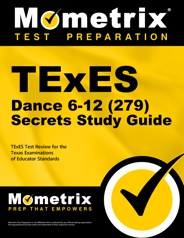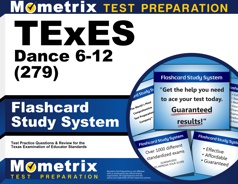The TExES Dance 6-12 exam is an assessment test designed to test the knowledge of entry-level dance teachers of students in grades 6-12 in the state of Texas.
Click “Start Test” above to take a free TExES Dance 6-12 practice test, and check out our premium-quality TExES test prep resources by clicking the links below!
TExES Dance 6-12 Exam Outline
The TExES Dance 6-12 exam contains 100 selected-response questions and has a time limit of 4 hours and 45 minutes.
Teaching Standards
The exam is aligned with the six standards for educators that have been outlined by the State Board for Educator Certification.
Click the button below to see the full list of approved educator standards:
Approved Educator Standards
Standard I: You are expected to understand dance techniques and movement analysis.
Standard II: You are expected to understand kinesiology, somatics, and healthy lifestyles.
Standard III: You are expected to understand the principles and processes for creating, performing, and producing dance.
Standard IV: You are expected to understand dance from different cultures and historical periods and the relationship of dance to other art forms and other disciplines.
Standard V: You are expected to understand skills for critically analyzing and evaluating dance.
Standard VI: You are expected to understand effective dance instruction and assessment.
Exam Domains
The exam is split into four domains, each of which covers one or more of the six standards mentioned above.
| Domain | Percentage of Exam | Standards Used |
|---|---|---|
| 1. Dance Elements and Skills | 41% | I and II |
| 2. Dance Creation and Production | 18% | III and V |
| 3. Dance Culture, History, and Analysis | 18% | IV and V |
| 4. Dance Education | 23% | I-VI |
1. Dance Elements and Skills (41%)
For the questions in this domain, you will be asked to demonstrate your knowledge of the following:
- Movement concepts
- Movement analysis
- Fundamental skills and concepts of ballet
- Fundamental skills and concepts of modern dance
- Fundamental skills and concepts of jazz and tap dance
- Fundamental skills and concepts of world and social dance
- Elements and principles of kinesiology and somatics as they relate to dance
- Promoting health, safety, and injury prevention in dance
2. Dance Creation and Production (18%)
For the questions in this domain, you will be asked to demonstrate your knowledge of the following:
- Choreographic principles and processes
- Choreographic devices and structures
- Basic principles of dance production
3. Dance Culture, History, and Analysis (18%)
For the questions in this domain, you will be asked to demonstrate your knowledge of the following:
- The relationships between culture and dance
- The history of science
- Basic principles of dance analysis and evaluation
4. Dance Education (23%)
For the questions in this domain, you will be asked to demonstrate your knowledge of the following:
- The relationships between dance and other art forms
- The relationships between dance and other disciplines
- Developing and using curricula and instructional strategies for dance education
- Instructional strategies that develop the creative and technical skills students need to create and perform dance worksBasic principles of and approaches to assessment in dance education
Check out Mometrix's Study Guide
Get practice questions, video tutorials, and detailed study lessons
Get Your Study Guide
TExES Dance 6-12 Exam Registration
To register for the TExES Dance 6-12 exam, you must create an online NES account via their website. Once your account has been created, you can use it to register for the exam and schedule an exam date. When you register, you will need to pay the $116 examination fee.
How to Study for the TExES Dance 6-12 Exam
Think you aren’t a good test-taker? Maybe on a study-time crunch? Or just don’t know how to begin studying? Mometrix has designed a new Study Secrets course to help every student, no matter what study scenario you are in. Here’s what you’ll find in the Study Secrets Course:
- Techniques to Conquer Procrastination
- Steps to building a Study Plan custom to your learning style
- 7 Effective Note-Taking Methods
- Test-Taking Tips
- Memory Techniques and Mnemonics
- And much more!
Everyone learns differently, so we’ve tailored our Study Secrets Course to ensure every learner has what they need to prepare for their upcoming exam or semester. Click below to check it out!
Test Day
On testing day, you should plan to arrive at the testing center about 30 minutes early. This will allow some extra time for the check-in process to take place. Upon arrival, you will be asked to sign in and provide at least one form of valid photo ID.
After the check-in process is complete, you will be asked to leave all personal items (cell phone, watch, wallet, keys, etc.) in a locker outside the testing area.
Once you enter the testing room, you will be given a brief tutorial on the computer-adaptive testing system before the exam begins.
How the TExES Dance 6-12 Exam is Scored
The TExES Dance 6-12 exam is computer-adaptive. Here’s a look at how it works:
The first question is judged to be of medium difficulty, and depending on your performance, the next question may be easier or harder. If you do well on the first question, the second question will be harder; conversely, if you do poorly on the first question, the second question will be easy.
The questions on this exam are rated on a scale of 100-300. The higher a question is rated, the harder the question is (e.g., a question marked as 290 will be more difficult than a question marked 190).
To pass the exam, your final question must be on or above the 240 mark. If your final question is below this mark, you will not pass the exam, even if you have answered some questions above the 240 mark at some point during the exam. This is because the computer has rated the difficulty of your final question based on how you answered the previous questions.
Check out Mometrix's Flashcards
Get complex subjects broken down into easily understandable concepts
Get Your Flashcards
FAQs
Q
How many questions are on the TExES Dance 6-12 exam?
A
There are 100 selected-response questions on the exam.
Q
How long is the TExES Dance 6-12 exam?
A
The time limit for this exam is 4 hours and 45 minutes.
Q
What is the passing score for the TExES Dance 6-12 exam?
A
To pass the exam, you must achieve a scaled score of at least 240.
Q
How much does the TExES Dance 6-12 exam cost?
A
The examination fee is $116.

